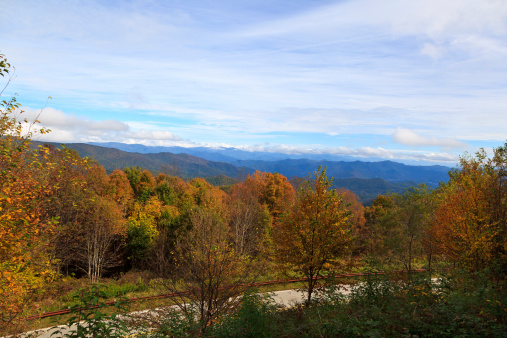This post is also available in:
 English
English
Covering a span of more than 655,000 acres, the Cherokee National Forest is one of our nation’s natural treasures. As such, this magnificent forest, which serves as much of the natural border between Tennessee and North Carolina, deserves to be protected. For years, environmental groups have worked diligently to protect the forest from environmentally unsound, illegal and greedy attempts at deforestation for profit. Little by little, they have secured small victories, each one resulting in the preservation of hundreds of acres of forest.
Conservation Efforts Highlights
In 2003, the Southern Environmental Law Center was successful in their appeal to halt plans that included clearing 84 acres of trees that sat in the Carter County section of the Cherokee National Forest. Concerns were raised about possible harm to the native flora and fauna of the affected forest area. At the time, a decision was made by officials to delay the sale of any timer until after a 30 day public notice had been given.
In another instance, in 2005, Watauga District Ranger Candace Allen was pressed to cancel a Walnut Mountain timber sale that had been scheduled in the Cherokee National Forest. 726 acres of logging was planned in areas that would have adversely impacted the Pond Mountain Wilderness and the Slide Hollow roadless area. Several environmental groups, including Cherokee Forest Voices, the Southern Appalachian Forest Coalition, and the Southern Environmental Law Center all joined in efforts to stop the project from moving forward.
Conservation groups again banned together in 2010 to stop a timber sale of 122 acres in the Cherokee Forest’s Laurel Mountain area. The original appeal was filed over concerns about loss of wildlife habitat, as well as mud runoff from the steep slopes that would be difficult to stop without the trees forming a natural barrier. As a result, the Forest Service agreed to withdraw plans for all Laurel Mountain area logging.
Also in 2010, the Tennessee Wilderness Act of 2010 was introduced. The Act, backed by a broad group of conservation organizations, and introduced by Senators Bob Corker and Lamar Alexander, was designed to protect new areas of the Cherokee National Forest on a permanent basis. In total, just over 19,500 acres of the forest would have been classified as wilderness.
When an area is given a ‘wilderness’ designation it is the highest level of protection afforded to public lands that are federally owned. That means that the nearly 20,000 acres would be legally untouchable by those looking for deforestation opportunities. The Tennessee Wilderness Act of 2010 represented the first wilderness designation effort in Tennessee in almost 25 years, following similar Acts in 1984 and 1986.
Unfortunately, the Act failed to make it to a vote, and the same Act has now been reintroduced as the Tennessee Wilderness Act of 2013. Currently in committee for review, the future of the Wilderness Act is uncertain, though progress updates are available for those who are interested.
What’s at Stake
Through the efforts of conservation groups, natural habitats have been protected and preserved, ensuring a safe haven for the forest’s indigenous fauna. The Cherokee National Forest is home to more than 260 bird species, including the northern saw-whet owl, the red-breasted nuthatch, and the blue-headed vireo. About 1,500 black bears live in the forest, as well, along with 43 other species of mammals, including white-tailed deer, bobcats, and the northern flying squirrel. In addition, 55 species of reptiles and amphibians call the forest home, as do 154 species of fish.
Thanks to ongoing conservation efforts, outdoor enthusiasts can continue to enjoy the splendor of the forest without the intrusion of excessive corporate and governmental deforestation efforts. Fishing, whitewater rafting, and hiking are popular outdoor activities for those visiting the forest, and the Cherokee National Forest boasts more than 30 campground sites.
Like anything of value, the Cherokee National Forest is worth fighting for. Thanks to the hard work and unrelenting support of conservation groups, the fight for this national treasure is being won one small victory at a time.



I live in the fish springs community bordering littie pond mountain the forest service has been working in the area. Ihope there not selling more timber they have given it away two times in the last 25 years. Its time we put a stop to this destroying our land scape.